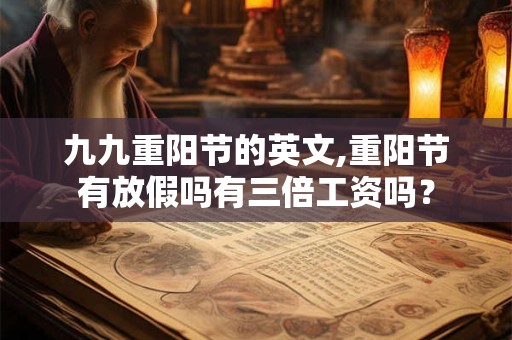Nestled in the heart of autumn, the Double Ninth Festival, also known as Chongyang Festival, is a traditional Chinese holiday celebrated on the ninth day of the ninth lunar month. This festival holds a special place in Chinese culture, blending age-old customs with modern practices. Here's a closer look at this significant occasion and its implications regarding work and leisure.

Festival Origins
The Double Ninth Festival dates back to the Eastern Han Dynasty and is rooted in the legend of a loyal official who saved his village from a plague by climbing a mountain and drinking chrysanthemum wine. Over the years, it has evolved into a day to honor the elderly and appreciate nature.
Celebrating the Elderly
One of the central themes of the festival is respecting and caring for the elderly. Family Gatherings are common, where younger generations visit their older relatives, bringing gifts and expressing their love and gratitude. This act of filial piety is deeply ingrained in Chinese culture.
Nature Appreciation
The festival also encourages people to Appreciate Nature. Many choose to go hiking, enjoying the crisp autumn air and the vibrant colors of the leaves. The chrysanthemum, a symbol of longevity and resilience, is particularly cherished during this time, often used in floral arrangements and consumed as tea.
Traditional Foods
Food plays a significant role in the festival. Chongyang Cake, a sweet, sticky rice cake, is a staple during the celebrations. It symbolizes reunion and happiness. Additionally, chrysanthemum wine is traditionally consumed, believed to have health benefits.
Cultural Activities
The festival is also marked by various Cultural Activities. Dragon and lion dances, folk music, and other performances are common sights. These activities not only entertain but also preserve the rich cultural heritage of China.
Modern Practices
In modern times, the festival has seen some adaptations. Work and Holiday Policies vary across different regions and industries. While some companies might offer a day off, others may not. It's important to note that the festival doesn't have a standardized national holiday status like other Chinese festivals.
Holiday Benefits
When it comes to Holiday Benefits, such as triple pay for working on the festival day, this varies greatly. In some industries, particularly in the service sector, employees might receive extra pay for working during the festival. However, this is not a universal practice and is often dependent on the company's policies.
Economic Impact
The festival also has a notable Economic Impact. The tourism industry, in particular, sees a surge in activity as people travel to scenic spots to celebrate. This can lead to increased revenue for local businesses, contributing to the economy.
Social Significance
The Double Ninth Festival holds immense Social Significance. It reinforces the importance of filial piety and respect for the elderly. It also serves as a reminder of the importance of maintaining cultural traditions in the face of rapid modernization.
Future Prospects
As China continues to evolve, the festival remains a vital part of its cultural fabric. Future Prospects include the potential for more standardized holiday policies and increased recognition of the festival's cultural and social importance.
In conclusion, the Double Ninth Festival is a beautiful blend of tradition and modernity. It offers a time for reflection, celebration, and connection. Whether through family gatherings, nature appreciation, or cultural activities, the festival serves as a reminder of the importance of respecting the elderly and preserving cultural heritage. While the specifics of work and holiday policies may vary, the festival's essence remains a cherished aspect of Chinese culture.
